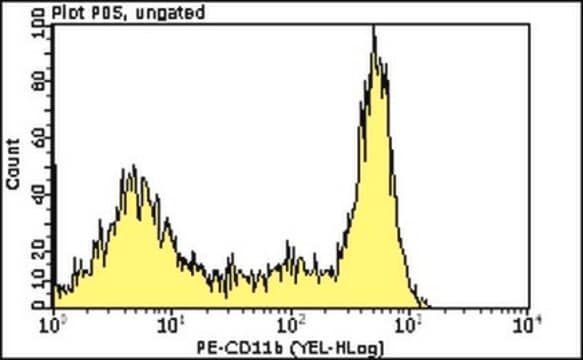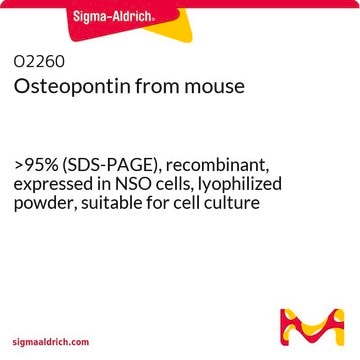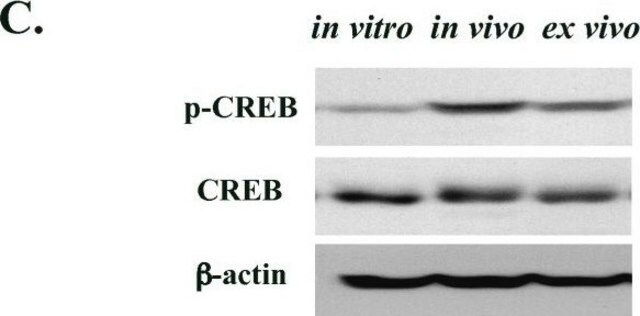499260
Osteopontin, His•Tag®, Mouse, Recombinant, Mouse
Synonym(e):
rmOPN
Anmeldenzur Ansicht organisationsspezifischer und vertraglich vereinbarter Preise
Alle Fotos(1)
About This Item
UNSPSC-Code:
12352202
NACRES:
NA.45
Empfohlene Produkte
Assay
≥95% (SDS-PAGE)
Qualitätsniveau
Form
lyophilized
Hersteller/Markenname
Calbiochem®
Lagerbedingungen
OK to freeze
Verunreinigungen
≤100 pg/μg Endotoxins (pg/μg rmOPN)
Versandbedingung
ambient
Lagertemp.
−70°C
Allgemeine Beschreibung
M.W. 65,000 and 30,000 under reducing conditions.
Recombinant, mouse osteopontin fused at the C-terminus to a His•Tag sequence and expressed in NSO-derived Leu17-Asn294 (Glu99Gly) murine myeloma cells. A secreted, highly acidic, Ca2+-binding, RGD-containing, phosphorylated glycoprotein. Chemotactic for macrophages, smooth muscle cells, endothelial cells, and glial cells. Has been shown to inhibit nitric oxide production and cytotoxicity by activated macrophages. Plays a significant role in inducing granulomas of various origin. OPN is also involved in the migration of embryonic fibroblasts, macrophages, and metastatic cells.
Recombinant, mouse osteopontin fused at the C-terminus to a His•Tag sequence and expressed in NSO-derived Leu17-Asn294 (Glu99Gly) murine myeloma cells. A secreted, highly acidic, calcium-binding, RGD-containing, phosphorylated glycoprotein. Osteopontin is expressed in several cell types including macrophages, fibroblasts, epithelial cells, T cells and osteoclasts in response to activation by cytokines, growth factors or inflammatory mediators. Mouse OPN cDNA encodes a 294 amino acid protein that has a 16 amino acid predicted signal peptide, which is cleaved to generate 278 amino acid mature protein. The mature protein contains an integrin binding arginine-glycine-aspartic acid (RGD) sequence. Exhibits some renoprotective actions in renal injury, such as increasing tolerance to acute ischemia, inhibiting inducible nitric oxide synthase, and reducing cell peroxide levels.
Biochem./physiol. Wirkung
~200 ng immobilized osteopontin/well will mediate the adhesion of ≥25% of the 293 cells plated at 10⁵ cells/well
Warnhinweis
Toxicity: Standard Handling (A)
Physikalische Form
Lyophilized from 0.2 µm sterile-filtered PBS, 50 µg BSA/µg rmOPN.
Rekonstituierung
Following reconstitution, aliquot and freeze (-70°C). Stock solutions are stable for up to 1 month at 4°C and for up to 3 months at -70°C. Avoid freeze/thaw cycles of stock solutions.
Reconstitute to ≥100 µg/ml with sterile PBS.
Sonstige Hinweise
Xie, Y., et al. 2001. Kidney Int.60, 1645.
Chiba, S., et al. 2000. Microbiol. Immunol. 44, 319.
Miyazaki, Y., et al. 1990. J. Biol. Chem. 265, 14432.
Chiba, S., et al. 2000. Microbiol. Immunol. 44, 319.
Miyazaki, Y., et al. 1990. J. Biol. Chem. 265, 14432.
Rechtliche Hinweise
CALBIOCHEM is a registered trademark of Merck KGaA, Darmstadt, Germany
HIS TAG is a registered trademark of Merck KGaA, Darmstadt, Germany
Lagerklassenschlüssel
11 - Combustible Solids
WGK
WGK 1
Flammpunkt (°F)
Not applicable
Flammpunkt (°C)
Not applicable
Analysenzertifikate (COA)
Suchen Sie nach Analysenzertifikate (COA), indem Sie die Lot-/Chargennummer des Produkts eingeben. Lot- und Chargennummern sind auf dem Produktetikett hinter den Wörtern ‘Lot’ oder ‘Batch’ (Lot oder Charge) zu finden.
Besitzen Sie dieses Produkt bereits?
In der Dokumentenbibliothek finden Sie die Dokumentation zu den Produkten, die Sie kürzlich erworben haben.
Kristen Johnson et al.
Journal of bone and mineral research : the official journal of the American Society for Bone and Mineral Research, 18(6), 994-1004 (2003-06-24)
Osteopontin and PP(i) both suppress hydroxyapatite deposition. Extracellular PP(i) deficiency causes spontaneous hypercalcification, yet unchallenged osteopontin knockout mice have only subtle mineralization abnormalities. We report that extracellular PP(i) deficiency promotes osteopontin deficiency and correction of osteopontin deficiency prevents hypercalcification, suggesting
Unser Team von Wissenschaftlern verfügt über Erfahrung in allen Forschungsbereichen einschließlich Life Science, Materialwissenschaften, chemischer Synthese, Chromatographie, Analytik und vielen mehr..
Setzen Sie sich mit dem technischen Dienst in Verbindung.








